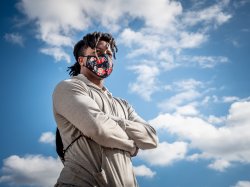NJ COVID-19 Service Corps Prepares for Recovery
New AmeriCorps initiative will keep allied health workers on the front lines
Posted in: Graduate School, Health, Homepage News, University

With new vaccines and the prospect that the pandemic’s end is in sight, allied health workers are readying for what comes next. For some, that will include remaining in the center of the crisis to help in the state’s recovery as part of the newly launched New Jersey COVID-19 Service Corps.
Montclair State is leading AmeriCorps efforts in providing New Jersey students and alumni the opportunity to serve with nonprofits and local agencies in meeting the urgent needs of the moment. The work will include easing fears about the vaccines and continuing efforts in tracing the contacts of the ill and supporting families from the most vulnerable communities.
The Center for Community Engagement recently secured a $418,000, three-year grant from the New Jersey Commission for National and Community Service for the efforts. An additional $100,000, one-year grant was awarded by the Robert Wood Johnson Foundation’s New Jersey Health Initiatives.
The program will focus on New Jersey’s low-income communities, where the impacts of the coronavirus itself, job loss, hunger, homelessness and limited access to medical and mental health care are endemic, says Bryan Murdock, director for the Center of Community Engagement.
“The combination of high unemployment, deep cuts to government budgets and the lingering threat of the coronavirus threatens to tear a gaping hole in the state’s safety net, further exposing its most vulnerable populations to even greater economic hardship and health risks,” Murdock says.
Montclair State’s graduate programs in Social Work and Public Health are actively recruiting and seeking to partner with nonprofit and local agencies on COVID-19-related responses, with plans to launch in February 2021. The AmeriCorps program provides a modest living stipend and an education award to use toward repaying students loans or on further education.
“We’re seeing that there is a distant light at the end of a very long tunnel,” says Lisa Lieberman, chairperson of Public Health, whose faculty and students, in both its bachelor’s and Master of Public Health programs, have been at the forefront of the crisis, providing education, contact tracing, commentary and leadership.
“Just because a vaccine exists doesn’t mean that tomorrow we’re all going to be safe and we can stop wearing masks. It’s going to be months and months and months before we can readily go back to weddings, parties and dining, doing all of the things that we’re used to doing together,” Lieberman says. “Until we get there, it’s going to require convincing a whole lot of people about vaccine safety, continued masking and other precautions, and meeting the logistic and equity challenges of vaccine distribution.”
The economic challenges are especially daunting, adds Lesley Dixon, clinical specialist and field director for the two-year-old Master of Social Work program.
“We have graduate students who are working with families impacted by lost wages and lack of stable and secure housing, helping them to access basic food needs; in school settings, providing support around social and emotional learning; and outpatient mental health centers, providing counseling and mental health support to children and families who have been impacted by the pandemic,” Dixon says.
AmeriCorps members already are serving communities devastated by the crisis, and the New Jersey Service Corps will expand upon this work in some of the hardest hit areas of the coronavirus pandemic.
“The goal here is in the face of a genuine national crisis, both economic and public health, to call on a generation of younger Americans to step forward and serve,” said Sen. Christopher A. Coons (D-Del.), who in May introduced the Pandemic Response and Opportunity Through National Service Act.
Higher education is spearheading the service opportunities in New Jersey. As a college-based program, the New Jersey COVID-19 Service Corps will be composed of members from Montclair State, The College of New Jersey, Rutgers School of Nursing and Rutgers New Brunswick in allied health programs, including nursing, social work, counseling, public health and nutrition. The longer-term vision is to create a college-based public health corps for the state of New Jersey, after the COVID-19 crisis recedes.
To be considered for the New Jersey COVID-19 Service Corps, send a resume and cover letter to Jessica Pichardo, AmeriCorps program manager at Montclair State University at pichardoj@montclair.edu.
A second service program, the New Jersey Scholar Corps, is aimed at inviting college students attending school out-of-state to come home to continue their studies, with the added incentive of participating in AmeriCorps-modeled programs to help rebuild the state’s economy and social services. This program, called “NJ Come Home,” additionally seeks to remedy the longstanding problem of students leaving the state and not returning – known as out-migration and “brain drain.”
Story by staff writer Marilyn Joyce Lehren
You May Also Like:
